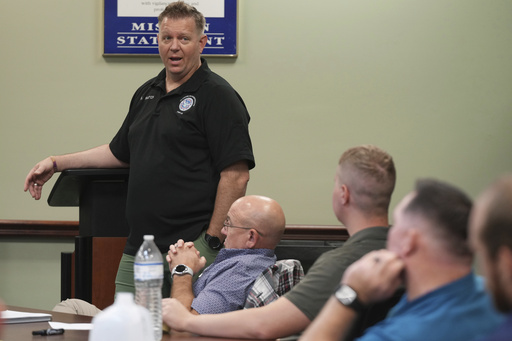DANIA BEACH, Florida — Border Patrol agents face the daunting challenge of enforcing contentious immigration policies, an effort that is increasingly scrutinized by Americans on both ends of the political spectrum. This situation has created significant stress for agents, prompting the agency to enhance training for selected individuals within its ranks to serve as chaplains, offering spiritual support for colleagues both at work and in their personal lives.
“Dealing with the pressure of fluctuating public perception is extremely difficult, especially as we find ourselves caught in the middle of it all,” explained Spencer Hatch, assistant chief of Border Patrol and manager of the chaplaincy program.
So, who precisely are the Border Patrol chaplains? Unlike their counterparts in military and traditional law enforcement, these chaplains typically come from among the agents themselves. Endorsed by various faith denominations, they undergo specialized training at a 2.5-week academy run by the agency. Since the program’s inception, the number of chaplains has increased from 130 four years ago to about 240 today. The academy conducts sessions three times a year at different Border Patrol stations. Just recently, approximately a dozen personnel, including those from the Fish and Wildlife Service and Bureau of Land Management, graduated from the latest training program near Miami.
The chaplaincy initiative, alongside a mental health-focused peer-support program, originated from grassroots movements in the 1990s. Chaplains maintain their regular roles while being available to provide assistance as needed.
What challenges do Border Patrol agents face? Primarily, they are driven by a strong commitment to safeguarding U.S. borders against various security threats, particularly the powerful smuggling cartels shaping border dynamics. Additionally, they often undertake the life-saving task of rescuing migrants stranded and in peril in the unforgiving deserts along the southern U.S. border.
Yet many agents feel that the American public perceives them as barriers to migrants pursuing a better life in the United States. Some agents are cautious about revealing their profession, often telling their children to say their parent is engaged in “government work” to avoid backlash, particularly within their local communities. This conflict between their pride in fulfilling their responsibilities and facing derogatory labels from the public compounds the emotional strain of their dangerous and often solitary work.
Chaplains play a pivotal role in assisting these 20,000 Border Patrol agents to manage their emotional well-being and prevent distress from escalating into crises, addiction, or even suicide.
The primary focus of most Border Patrol chaplains tends to be compassionate support rather than faith-specific worship. Although they are predominantly Christian, there are also Muslim and Jewish representatives in the mix. The chaplains typically raise religious topics only if their colleagues initiate the conversation. Their duties encompass providing comfort during critical events, such as when an agent is facing suicidal thoughts or when a family must be notified of an on-duty death. They also offer counseling to those grappling with issues like addiction, survivor’s guilt, and other forms of trauma.
Chaplains-in-training engage in role-playing scenarios at the academy to sharpen their skills for these challenging situations. They also learn important themes around communication and family dynamics, understanding that frequent redeployments—sometimes reaching up to nine times in 18 months—can have a significant impact on family life as well.
Hatch emphasizes the dual need for agents to remain “hyper-vigilant” as law enforcement while nurturing humanitarian instincts to empathize with both their colleagues and the migrants they encounter. Many agents express deep concern for migrant children victimized by smugglers. “Providing support within the boundaries of our responsibilities, I always strive to wear the best smile,” shared Yaira Santiago, a new chaplain and former schoolteacher now working at a Border Patrol migrant processing center in Southern California.
By utilizing their faith, dedication to their peers, and extensive training, chaplains can significantly contribute to well-being in this demanding environment. “Even during uncertain times, simply being there can make a substantial difference,” reflected Matt Kiniery, a seasoned Border Patrol agent from El Paso, Texas, who is also a recent graduate of the chaplain academy.
